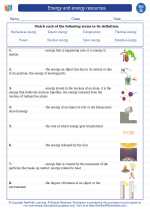Humidity
Definition: Humidity refers to the amount of water vapor present in the air. It is an important factor in weather and climate, as it influences temperature, precipitation, and comfort levels for living organisms.
Types of Humidity
1. Absolute Humidity: Absolute humidity is the actual amount of water vapor present in a unit volume of air, usually expressed in grams per cubic meter (g/m3).
2. Relative Humidity: Relative humidity is the ratio of the amount of water vapor present in the air to the maximum amount of water vapor the air can hold at a specific temperature. It is expressed as a percentage.
Factors Affecting Humidity
Several factors can affect humidity levels:
- Temperature: Warmer air can hold more water vapor than cooler air. As a result, the relative humidity decreases as temperature increases, and vice versa.
- Evaporation: Bodies of water, such as oceans, lakes, and rivers, can contribute to the moisture content in the air through evaporation.
- Transpiration: Plants release water vapor through a process called transpiration, which can increase humidity levels in the surrounding air.
- Geographic Location: Humidity levels can vary based on the proximity to bodies of water, altitude, and prevailing wind patterns.
Measuring Humidity
Humidity can be measured using instruments called hygrometers. There are different types of hygrometers, including psychrometers, hair hygrometers, and electronic hygrometers, each with its own method of measuring humidity.
Effects of Humidity
Humidity can have various effects, including:
- Comfort Levels: High humidity can make the air feel warmer than it actually is, leading to discomfort. Low humidity can cause dry skin and respiratory issues.
- Weather Patterns: Humidity plays a role in the formation of clouds, precipitation, and the development of weather systems.
- Health Impacts: Extreme humidity levels can contribute to heat-related illnesses and mold growth in indoor environments.
Study Guide
When studying humidity, consider the following key points:
- Understand the difference between absolute humidity and relative humidity.
- Learn how temperature affects humidity levels.
- Explore the factors that contribute to changes in humidity, such as evaporation and transpiration.
- Examine the importance of humidity in weather patterns and its impact on human comfort and health.
- Review the various methods used to measure humidity.
By mastering these concepts, you will have a solid understanding of humidity and its significance in the natural world.
.





